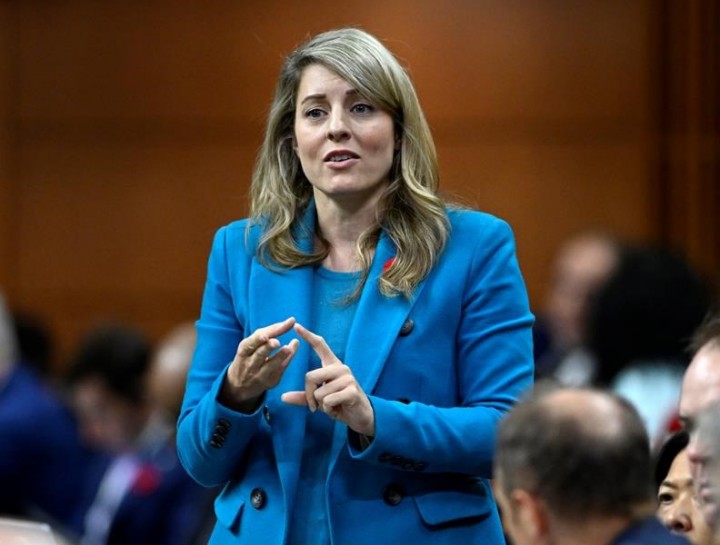OTTAWA — Foreign Affairs Minister Mélanie Joly is warning businesses against deepening their ties with China as part of a long-anticipated Indo-Pacific strategy, which she says is coming by early December.
“We will challenge China when we ought to, and we will co-operate with China when we must,” Joly said in a Wednesday morning speech, adding that Canada will seek deeper ties with more democratic, reliable countries such as India.
“The tectonic plates of the world’s power structures are moving,” Joly told the Munk School of Global Affairs and Public Policy at the University of Toronto.
“The decisions made in the region will impact Canadian lives for generations. We must be at the table, step up our game and increase our influence.”
Canada’s foreign service will be tasked with training more China experts and placing them in “key embassies” around the world.
“That will become a focus of our diplomatic effort,” Joly said.
She said China is increasingly diverging from Canadian values, and so businesses operating in that country face risks of political interference and the violation of trade rules.
“China is an increasingly disruptive global power,” Joly said.
She said Canada can work with China on issues like climate change and will continue trade, but she has serious concerns about Beijing undermining global security, commerce and peace.
“Canada will neverapologize for its national interests. Andwe won’t be sorry for seeking to uphold the global rules that govern trade (and) human rights,” she said.
Part of that includes “credible accounts of human rights abuses and crimes against humanity” in the Xinjiang region against the Muslim minority known as the Uyghurs.
Joly also spoke of Canada’s current military presence in the region, and suggested there may be more focus on containing China’s maritime boundaries and disincentivizing an invasion of Taiwan.
She made an indirect reference to China’s repeated “buzzing” of military aircraft owned by Canada and other allies who are monitoring whether North Korea is trying to evade United Nations sanctions.
The remarks represent a major pivot for the Liberals, who have generally tried to avoid hostile rhetoric about Beijing even as China arbitrarily detained Canadian nationals Michael Spavor and Michael Kovrig for nearly three years.
“What I would like to say to Canadians doing business in and with China: you need to be clear-eyed,” Joly said, noting “geopolitical risks linked to doing business with the country.”
Yet she warned against discrimination.
“We’ll always differentiate between the actions of the Chinese government and of the Chinese people.”
The speech, which was sponsored by the Asia Pacific Foundation of Canada, a government think tank, portends more federal spending on diplomatic missions.
“We must deepen our existing friendships, like with Japan and South Korea, and we also need to seek new allies,” she said, while noting “the remarkable trajectory of India, the world’s largest democracy.”
Yet Joly’s speech struck a slightly different tone than recent warnings from Deputy Prime Minister Chrystia Freeland about diverting economic ties to like-minded countries.
“We need to engage even when we disagree,” Joly said in her speech.
“I’m not into door-closing, I must say. I’m into opening doors,” she added, in response to an audience question.
She said Canada offers natural resources, food and innovation, while being a stable democracy open to ideas and people from around the world.
Joly said Wednesday she will launch the Indo-Pacific strategy within a month.
Business leaders and former diplomats have been pushing for the strategy, which the Liberals have promised at multiple points in recent years.
Joly unveiled five objectives for the policy, including peace, supply-chain resilience, human and women’s rights, climate change and deepening Canada’s global presence.
The Business Council of Canada welcomed the news that a strategy is finally coming.
“Canada needs a clear, consistent policy governing how we engage with other Indo-Pacific nations,” wrote Goldy Hyder, the group’s president.
“The China policy announced today combines a realistic appraisal of the risks and regional tensions, with a candid recognition Canada must continue to work with China on global priorities such as emissions reductions.”
Joly will join Prime Minister Justin Trudeau on a trip to the region starting Thursday for summits focused on economic co-operation.
Analysts are watching for whether that will mean relief for supply-chain woes and food shortages, as countries try to navigate their response to Russia’s invasion of Ukraine.
“Unfortunately, the geopolitical issues of the day are really making it hard to have these kinds of productive discussions,” said Asia Pacific Foundation CEO Jeff Nankivell.
The first stop is Cambodia for the Association of South East Asian Nations leaders’ summit. Canada is in trade negotiations with the economically booming bloc of 10 countries.
Nankivell said Canada has good relationships in Southeast Asia, but is notorious for its inconsistency.
“Our engagement has been sort of sporadic. We get enthusiastic at some times, and then we don’t really follow through,” he said in an interview.
“We need to overcome skepticism among ASEAN members as to how committed we really are.”
The second stop will be the G20 leaders’ summit in Bali, where the Indonesian government is asking guests to focus on shoring up health systems, preventing food shortages and ensuring stable, green energy.
Chinese President Xi Jinping is expected to attend, which would be his first visit to a global forum since the start of the COVID-19 pandemic.
The third visit is to the Asia-Pacific Economic Cooperation leaders’ forum in Bangkok, Thailand, with a focus on supply chains and trade flows.
Joly will not be present for the Thailand summit, instead getting a head start at the Francophonie summit in Tunisia, which Trudeau will join later.
This report by The Canadian Press was first published Nov. 9, 2022.
Dylan Robertson, The Canadian Press
